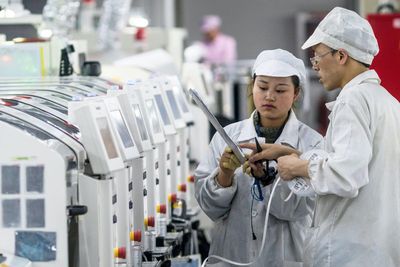Production on Apple's devices has been stymied in recent weeks due to delays caused by the coronavirus outbreak in China. Many of Apple's China-based suppliers had to shut down for two weeks or more in February, and there are still staffing issues as factories work to ramp up production around travel bans, quarantines, and other problems.

Amid the China coronavirus outbreak, which has caused Apple to announce that it won't make its March quarter revenue goals, The Wall Street Journal has taken a look at Apple's reliance on China and why Apple is likely to continue to be dependent on China for the foreseeable future.
Apple's operations team has been raising concerns about the company's reliance on China, and as early as 2015, there were suggestions that Apple relocate assembly of one or more products to Vietnam, allowing Apple to start training workers and creating component providers outside of China.
Senior managers shot down the idea at the time, and transitioning away from China has been "too challenging to undertake." Apple has, however, begun to move some production outside of China. Apple has moved AirPods Pro assembly to Vietnam due to tariffs, and now produces some iPhones in India, but a complete break "is impossible."
As The Wall Street Journal points out, Apple CEO Tim Cook has been downplaying the need for changes in the supply chain. On Friday, Cook said in an interview that if there are supply chain changes because of the coronavirus, it will be "adjusting some knobs, not some kind of wholesale fundamental change."
Apple is not able to break away from China because China has hundreds of thousands of employees, both skilled and unskilled, that have expertise in manufacturing Apple's devices.
Finding a comparable amount of unskilled and skilled labor is impossible, said Dan Panzica, a former Foxconn executive. The population in China has allowed suppliers to build factories with a capacity for more than 250,000 people. The number of migrant workers in China, who do much of Apple's production, exceed Vietnam's total population of 100 million. India is the closest comparison, but its roads, ports and infrastructure lag far behind those in China.
"You're not going to be able to have mega-factories anywhere else," Mr. Panzica said. "You're going to have to break them up."
Should Apple decide to move production out of China, that could impact device sales in the country. China is responsible for close to a fifth of Apple's total revenue.
Apple's relationship with China began many years ago, when Foxconn began making iPods in 2001 and the iPhone in 2007. As Apple device sales have grown, the factories that assemble Apple devices have also grown in tandem, resulting in what The Wall Street Journal describes as a "triangle of interdependency."
Apple grew to depend on Foxconn to make devices and Chinese consumers to buy them. Foxconn built its business by leaning on China's vast workforce and control over land to construct factories. And China became beholden to Foxconn as the nation's largest private-sector employer and Apple as a trainer of new technology suppliers.
Apple did plan to assemble some iPhone 11 models in India, but the effort was halted before a single manufacturing line was set up, as Apple believed India was not ready to supply the skilled labor or robust infrastructure that Apple expects. iPhone 11 models were produced in China instead.
That's not likely to change in 2020 because there's no supply chain in place and workers in India aren't ready to produce the high-end iPhones that are expected to be released in 2020. As for U.S. production, Apple is manufacturing some Mac Pro models in the United States (those sold in the United States), but Mac Pro models sold in the rest of the world are still manufactured in China because the U.S. also doesn't have the skilled labor force that China has available.
The Wall Street Journal's full report on Apple's dependence on China can be read on The Wall Street Journal website.
Note: Due to the political nature of the discussion regarding this topic, the discussion thread is located in our Political News forum. All forum members and site visitors are welcome to read and follow the thread, but posting is limited to forum members with at least 100 posts.





















